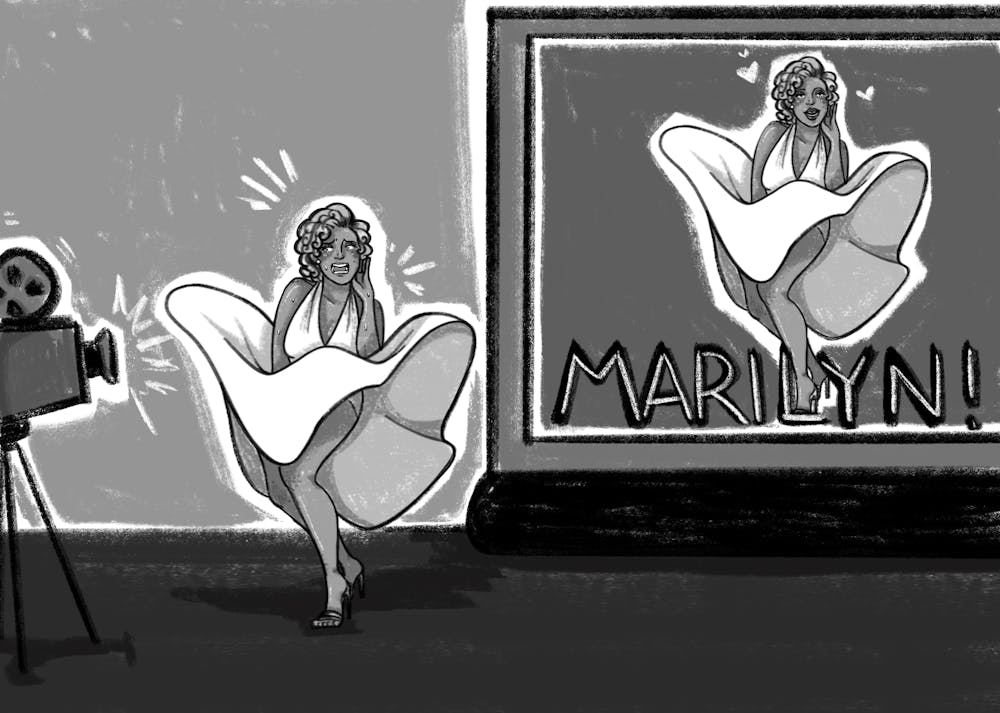Awards season is full of surprises, yet one consistent expectation is the presence of biographical films. This year, biopics "Elvis" and "Blonde" held the spotlight not just for their notable celebrity subjects, but also their controversial filmmaking and directorial practices.
Baz Luhrmann's "Elvis," a fan favorite for awards thus far, has already taken home four BAFTAs, one nomination at the SAG Awards and eight nominations at the upcoming Oscars. "Blonde" has trailed in comparison, with Ana de Armas' portrayal of Marilyn Monroe earning the film a singular Oscar nomination for "Actress in a Leading Role."
Like the Academy, audiences have become captivated by the flashing lights and eccentric ambience of "Elvis." However, critics have expressed disapproval of the film and its nominations due to the controversial performance of Tom Hanks as Colonel Tom Parker.
"Despite the fact that I really do like Baz Luhrmann's work … I thought the nuances, the sound, the physicality and Austin, whatever his name is deserves this award," said clinical assistant professor Angela Giron, who specializes in film, media and popular culture. "Tom Hanks, on the other hand, as Colonel, I felt phoned it in and I thought that was a shame."
Students also felt underwhelmed by the film, despite the Academy's praise.
"When you think of the popular (biopics), usually it's like a musician and it just makes them all grand spectacular even more than they already were," said Otto Brink, a junior studying political science and film fanatic. "There's no humanity in it. It's all just glamor."
A problem many biopics face in the eyes of the public is properly embodying the person they're creating a film about, while maintaining respectful commemoration. A good place to start deciphering whether or not a production was made with discretion and respect is with its source material.
"It's truly impossible, in a general sense, to get a complete, accurate picture of a person ... because even for films, you're going to have to cut something out." said Czarina Flores, a junior film and media studies major.
While "Elvis" may have had to cut down on moments throughout the singer's long life to produce the film, "Blonde" goes another direction. It fictionalizes the life of Marilyn Monroe.
Portrayed by de Armas, Monroe's story is told through scenes that left audiences rightfully uncomfortable; a disturbing, imagined conversation Monroe has with her unborn fetus, the off-putting assault of Monroe in the film and an unfounded depiction of a "throuple" between Monroe, Charlie Chaplin Jr. and Edward G. Robinson Jr.
"I thought the film was uneven," Giron said. "Although I thought (de Armas') performance was good, I didn't think 'Blonde' cut the mustard."
While many people recognized that Dominik adapted the film from the fictionalized depiction in the novel "Blonde" by Joyce Carol Oates, it still received negative feedback due to a lack of empathy. In the production's endeavor to bring new life to one of Hollywood's most iconic starlets, they forgot that Marilyn Monroe was more than just what was done to her by the predatory men in her life, and more importantly, she was more than her suffering.
"It's just a much more interesting movie if you have an actual mixed character that has good qualities and bad qualities," Brink said.
In addition to their many official awards and nominations, both controversial films have also garnered recognition from the satirical Golden Raspberry Awards. In fact, "Blonde" dominated Razzie nominations, with eight total including "Worst Picture" and "Worst Remake."
Citing these films as some of cinema's "failures," the Razzies nominated both "Elvis" and "Blonde" for "Worst Supporting Actor" and "Worst Screen Couple."
"I think the biggest thing to always remember ... who is telling the story?" Flores said. "When is it being told and why? That's probably the most underlying question: why is it suited for you now? Why did this person choose to do the story?"
Biopics rest in media's ethical gray area between entertaining, informing and eulogizing. While there are countless stories to be told, it's up to filmmakers to carry on crafting these pictures with care and regard to draw the distinct line between commemoration and caricatures.
To Giron, it isn't the accuracy or the source material that truly matters.
"I think that's the artistry of the actors, the artistry of the director, the production team, the cinematographer," Giron said. "All of that is essential to creating a great work, and if one of those fails … it affects the whole."
Edited by Claire van Doren, Reagan Priest and Caera Learmonth.
Reach the reporter at amvald11@asu.edu and follow @anxieteandbread on Twitter.
Like The State Press on Facebook and follow @statepress on Twitter.

Analisa Valdez is a reporter with the Echo, focusing on covering the arts and entertainment world. Analisa has been apart of the State Press for two and a half years and is in her third year at the Walter Cronkite School of Journalism and Mass Communication.




